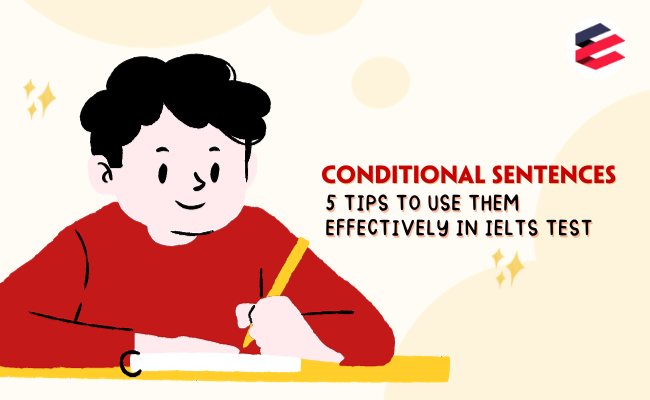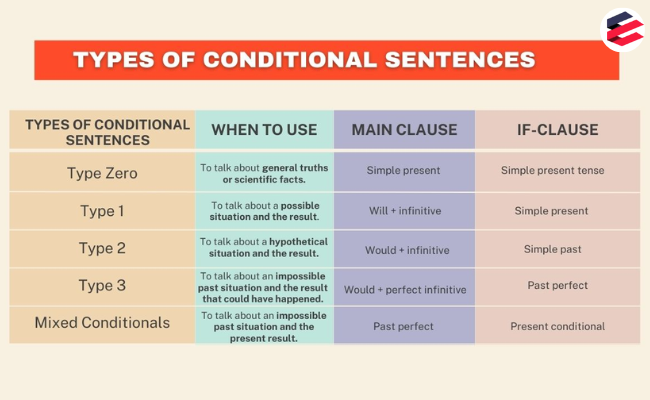Mastering Conditional Sentences: 5 Tips to use them effectively in IELTS test
Within the vast landscape of English grammar, mastering the nuances of conditional sentences holds significant importance, especially when aiming for a commendable performance in the International English Language Testing System (IELTS). This article delves into the intricacies of conditional sentences, their diverse applications, and the pivotal role they play in elevating one’s linguistic competency within the context of the IELTS examination.

1. What are conditional sentences?
Conditional sentences are a specific type of sentence used in English (and many other languages) to express that the action or situation described in the main clause depends on certain conditions. These conditions can be real, hypothetical, or contrary to fact.
Conditional sentences typically consist of two main parts: the “if” clause (the condition) and the main clause (the result or consequence).
If + Clause
2. How many types of conditional sentences?
There are typically four main types of conditional sentences in English grammar, each with its own structure and usage. Additionally, there are also mixed conditionals that combine elements from different types of conditionals. Here’s an overview of the main types:
2.1. Zero Conditional
- Describes general truths, facts, or natural laws.
- Structure: If + present simple, present simple.
- Example: If you heat water to 100 degrees Celsius, it boils.
2.2. First Conditional
- Describes a likely or possible future event or situation based on a specific condition.
- Structure: If + present simple, will + base form of the verb.
- Example: If it rains, we will stay at home.
2.3. Second Conditional
- Describes an unlikely or hypothetical situation in the present or future.
- Structure: If + past simple, would + base form of the verb.
- Example: If I won the lottery, I would travel around the world.
2.4. Third Conditional
- Describes a situation that did not happen in the past, a past unreal condition.
- Structure: If + past perfect, would have + past participle.
- Example: If she had studied harder, she would have passed the exam.
2.5. Mixed Conditionals
- Combine elements from both the second and third conditionals, often showing a connection between a past condition and its present or future result.
- Example: If I had known you were coming (past), I would be at home now (present).

3. How to use conditional sentences in IELTS?
Conditional sentences play significant roles in IELTS, particularly in the Writing and Speaking sections. These sentence structures showcase your ability to use complex grammatical forms accurately and appropriately, which can positively impact your band score.
3.1. IELTS Writing
- Expressing Different Views: Use conditionals to show varying perspectives. For example: “If one considers the economic factors, it becomes clear that globalization has both benefits and drawbacks.”
- Discussing Hypothetical Scenarios: Employ second and third conditionals to discuss hypothetical situations, especially in Task 2 essays. This showcases your ability to handle complex language structures.
- Presenting Recommendations or Suggestions: Use the first conditional to suggest possible solutions or recommendations for a given issue: “If governments invest in renewable energy, they can reduce carbon emissions.”
- Highlighting Cause and Effect: Use conditional sentences to illustrate cause and effect relationships. For instance: “If the government imposes higher taxes on sugary drinks, consumption will likely decrease.”
3.2. IELTS Speaking
- Expressing Hypothetical Situations: Utilize the second conditional to answer hypothetical questions: “If I had a lot of money, I would travel the world.”
- Talking About Future Plans or Intentions: Use the first conditional to discuss your future plans: “If I pass the exam, I will apply for a scholarship.”
- Discussing Hobbies or Interests: Employ conditionals to explain what you would do in certain situations related to your hobbies: “If I have free time, I usually go hiking.”
- Expressing Regrets or Past Actions: Use the third conditional to talk about things you regret or actions you would have taken differently in the past: “If I had studied harder, I would have gotten a higher score.”
In both the IELTS Writing and IELTS Speaking sections, it’s important to use conditionals appropriately and accurately to convey your thoughts effectively. Be mindful of the specific context and ensure that the usage of conditionals enhances the overall coherence and coherence of your response. Practice incorporating conditionals in your responses during your preparation for the exam to become more comfortable and proficient in using them.
4. Tips for using conditional sentences in IELTS
Using conditionals effectively and appropriately can enhance your language complexity, which is one of the key aspects assessed in both writing and speaking during the IELTS exam. Here are some helpful tips for IELTS test-takers:
- Be Accurate: Ensure your usage of conditionals is grammatically correct and appropriate for the context.
- Vary Sentence Structures: Incorporate different types of conditionals to showcase language complexity.
- Practice Appropriately: Familiarize yourself with various contexts where conditionals are commonly used in both written and spoken English.
- Use for Speculation: Use second and third conditionals to speculate about hypothetical situations, which can enhance your writing and speaking.
- Demonstrate a Range of Grammar: Conditionals are just one part of grammar; aim to showcase a range of complex grammatical structures in your responses.
>> See also: word formation

5. Practice conditional sentences
Exercise 1: Fill in the blank
- If we meet at 9:30, we _____ (to have) plenty of time.
- Lisa would find the milk if she _____ (to look) in the fridge.
- The zookeeper would have punished her with a fine if she _____ (to feed) the animals.
- If you spoke louder, your classmates _______ (to understand) you.
- Dan ______ (to arrive) safe if he drove slowly.
- You ______ (to have) no trouble at school if you had done your homework.
- If you ________ (to swim) in this lake, you’ll shiver from cold.
- The door will unlock if you ________ (to press) the green button.
- If Mel ______ (to ask) her teacher, he’d have answered her questions.
- I ______ (to call) the office if I was/were you.
Answer:
- If we meet at 9:30, we will have plenty of time.
- Lisa would find the milk if she looked in the fridge.
- The zookeeper would have punished her with a fine if she had fed the animals.
- If you spoke louder, your classmates would understand you.
- Dan would arrive safe if he drove slowly.
- You would have had no trouble at school if you had done your homework.
- If you swim in this lake, you’ll shiver from cold.
- The door will unlock if you press the green button.
- If Mel had asked her teacher, he’d have answered her questions.
- I would call the office if I was/were you.
Exercise 2: Complete the Conditional Sentences. Decide whether to use Type I, II or III.
If I had time, I _______ shopping with you.
If you ______ English, you will get along with them perfectly.
If they had gone for a walk, they _______ the lights off.
If she _______ to see us, we will go to the zoo.
I would have told you, if I ______ him.
Would you mind if I _______ the window?
If they ______ me, I wouldn’t have said no.
My friend _____ me at the station if he gets the afternoon off.
If I ________ it, nobody would do it.
If my father ______ me up, I’ll take the bus home.
Answer:
If I had time, I would go shopping with you.
If you speak English, you will get along with them perfectly.
If they had gone for a walk, they would have turned the lights off.
If she comes to see us, we will go to the zoo.
I would have told you, if I had seen him.
Would you mind if I opened the window?
If they had invited me, I wouldn’t have said no.
My friend will meet me at the station if he gets the afternoon off.
If I didn’t do it, nobody would do it.
If my father doesn’t pick me up, I’ll take the bus home.
In conclusion, the artful use of conditional sentences can notably enhance one’s language complexity and accuracy in the IELTS exam. Thus, in order to conquer the grammar for IELTS, you should pay attention to it!
From establishing hypotheticals to reflecting on past decisions, the diverse range of conditionals offers a powerful tool to showcase linguistic prowess. Through deliberate practice and an understanding of when and how to use each type of conditional sentence appropriately, test-takers can wield this grammatical structure effectively, portraying an advanced understanding of English language nuances. Aspiring IELTS candidates are encouraged to embrace and master the art of constructing precise and contextually apt conditional sentences, recognizing their potential to unlock higher bands and provide a nuanced expression of ideas. Start our IELTS online test now!